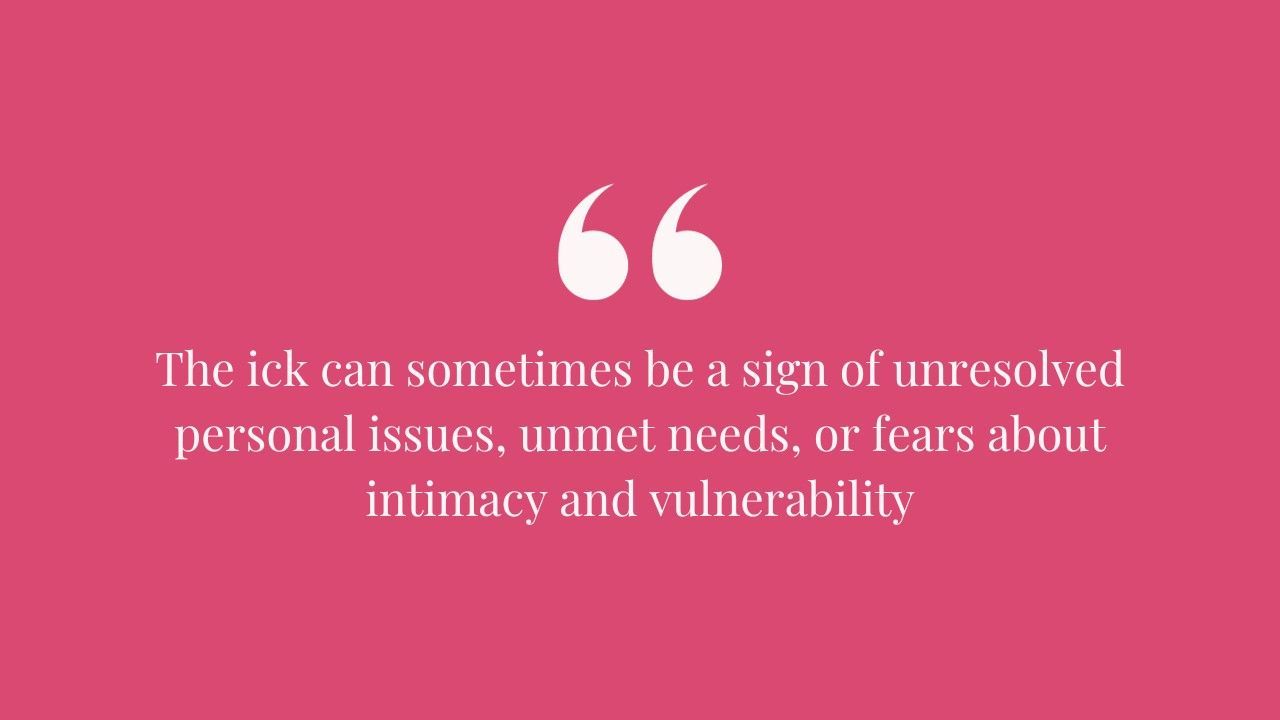Got ‘the ick’? We explore the truth behind why we suddenly lose all feels
updated on Oct 18, 2023

Exploring the phenomenon that spells dating disaster, and what relationship ‘icks’ are really all about
I started dating last year after my marriage ended and, let me tell you, there was a lot to learn. From which photos to use on my dating profile, to figuring out who pays the bill on the first date, I was bamboozled by this new world.
But one concept I didn’t have to learn about was ‘the ick’, because even though I’d never heard the term itself, I soon experienced it on a date, and learned that it’s a gut feeling you cannot ignore.
My experience was with a gorgeous brunette who had a great job, interesting chat, and cool taste in music. Our first date was in a bar where we had a drink to see if we vibed. Sparks were flying, but about an hour into our conversation, I started to notice something. She looked familiar. As she took a sip of her gin and licked her lips I realised: she looked exactly like my ex-husband’s sister.
In that instant, any romantic feelings I had towards this beautiful woman vanished, because there was just no way I could be attracted to someone who looks like a person who I, until very recently, considered family.

What is the ick?
I spoke to Dr Sara Tookey, clinical psychologist and founder of True North Psychology, who explained that the ick is “a term commonly used to describe a sudden feeling of discomfort or repulsion that can arise in the early stages of a romantic relationship. It might manifest as finding small habits or behaviours unattractive, or feeling a general aversion towards the person.”
It could be something about their appearance, such as choosing to wear a tracksuit to dinner or having really long nails. On the other hand, it could be something that you feel crosses a boundary, such as being too touchy-feely, or asking extremely personal questions too early on. Whatever the ick, it’s something that tends to turn you off and make you cringe.
“If you notice a significant shift in your feelings towards someone, where you feel repelled or consistently bothered by their presence or actions,” says Dr Tookey, “it could be a sign that you’ve caught the ick.”
Why do we get the ick?
The interesting thing about icks is that they can be an opportunity to learn a lot about yourself. Jacques Lacan’s mirror theory says that the things we dislike in a partner are things that need attention within ourselves.
For example, if you get the ick because your love interest speaks too loudly in public, it may highlight that you despise that same trait in yourself, even if you’re not conscious of it. The inverse can also be true: you may have a deep-rooted fear of being the centre of attention, and this ick is an invitation to address your tendency to be quiet, instead of expressing yourself authentically.
When we dig deeper, the icks you have can tell you a lot about your capacity to even be in a relationship. According to Dr Tookey, “The ick can sometimes be a sign of unresolved personal issues, unmet needs, or fears about intimacy and vulnerability.”
Dealing with icks
It’s common for icks to appear when the shine of a new romance wears off. Something that may have seemed like a cute quirk in the beginning becomes an irritation, and the more irritable you become, the more icks appear, and so the spiral continues.
But you don’t have to write someone off immediately because of an ick. It’s worth being patient and seeing how things play out, because you may have found something ick-worthy for entirely separate reasons, such as work stress, lack of sleep, or perhaps you were just having a bad day.
When the ick is small and seemingly insignificant, it can be tempting to brush it under the rug. But bringing it to light either in your journal, with friends, a therapist, or with your partner can be enough to dismantle the ick, and move forward positively.

Self-reflection
It’s normal to get the ick now and again, after all, you’re only human and can’t possibly click with every person you date. However, if you notice a pattern of getting the ick with every connection, it may be a sign that you’ve formed the habit as a way to distance yourself from getting into a committed relationship.
Look back on your dating history. Do you have a list of very specific flaws about every person you’ve been involved with? Did these icks appear as soon as you hit a relationship milestone, e.g. at the one-year mark, or when you became ‘official’?
The hard question to ask here is: what is this ick really about? And is it triggering something in me that needs attention?
It’s worth pondering, also, whether you have unconsciously chosen to set the bar so high for your potential partner that, realistically, no one could ever make the grade. Using perfectionism as a defence mechanism is normal, and unpicking this can lead to self-growth and happy relationships.
Dr Tookey says self-reflection is key. “Examining your beliefs about intimacy, past relationships, and fears related to vulnerability can provide insights into whether the ick is acting as a barrier to deeper emotional connections. Engaging in therapy, particularly focusing on interpersonal relationships, can help explore these patterns and develop strategies to overcome them.”
What about long-term relationship icks?
There’s no doubt that getting the ick when you’re in the early stages of dating is way easier to deal with than in a long-term relationship. After all, the whole point of dating is to get to know each other and find out if you’re compatible. But, if you’ve been in a committed partnership with someone for years, getting the ick can be unnerving.
It doesn’t necessarily mean things are over, and how you approach the situation will be unique to your own experience and circumstances. “It’s crucial to differentiate between temporary phases of discontentment that can be addressed, and deeper, persistent issues,” says Dr Tookey. “Open and honest communication is essential in discussing your feelings and concerns. Exploring the source of the discomfort, seeking couples therapy, or individual therapy, can help to identify and work through underlying issues.”
So, instead of ending your relationship straight off the bat, use icks as an opportunity to nurture yourself first. Then make an informed choice about how to move forward, with or without your partner.

